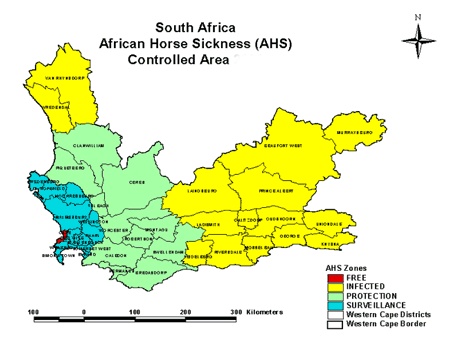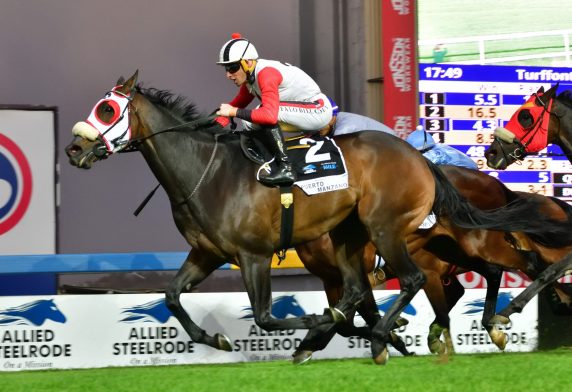In a press release issued on 1 February 2017, the Western Cape Government has reminded the equestrian community that the annual ban on direct movement of horses into the Western Cape’s African Horse Sickness (AHS) Controlled Area zones comes into effect today.
Alan Winde, Minister of Economic Opportunities, said the movement restrictions, imposed every year at this time, mean that all horses entering the province’s AHS Controlled Area from the AHS infected zone, are required to spend 14 days at an approved stop-over quarantine facility.
“The high risk AHS season is from 1 February to 30 June. In order to manage the risk, all horses entering the province during these months will be held at an approved facility for a minimum of 14 days. After this period, they will be tested to prove they are free of AHS. This test will take place at a lab approved by the National Department of Agriculture, Forestry and Fisheries (DAFF). Once cleared through this process, the horses will be able to enter the Western Cape’s AHS Controlled Area.”
Minister Winde added that according to the AHS Control Policy: Movement Control Protocol, all horses entering the AHS Controlled Area, from an AHS Infected Zone, must have been vaccinated within the past two years and not less than 40 days prior to entry.
Kindly see attached a map of the AHS controlled area and the Standard Operating Procedure for AHS Stop-Over Quarantine.
The following Standard Operating Procedure applies to all stop over movements:
1. All Stop Over Movements must be coordinated through Mrs Danielle Pienaar who may be contacted telephonically on 082 936 3604 or by email on [email protected]. Danielle will supply details of approved Stop Over Quarantine (SOQ) facilities and she must be copied with all the information detailed below.
2. Permission must be obtained from the authorized Stop-Over Quarantine holding manager that space is available. This is the responsibility of the owner or agent of the horse, not SV Boland. The State Vet (SV) in whose area the SOQ falls must be informed that a horse/s will be coming into his
area from a high AHS risk area.
3. A horse may not be accepted to start the 14 day Stop over quarantine period if vaccination against AHS has been given less than 40 days previously. Quarantine may only commence if vaccination is greater than 40 days previously.
4. The State Vet in whose area the SOQ falls may require a negative RT-PCR test, done at an approved laboratory, at origin before he/she will accept horses from a high risk area into his/her SV area. Blood collected for this purpose may not be collected more than 3 days prior to movement. Therefore it is suggested that the person collecting the sample contact the laboratory to ensure that the results will be available to the State Vet and Danielle prior to planned movement of the horse. Horses will not be accepted into SOQ without a negative result.
5. Once the horse/s arrive at the SOQ the local SV must be contacted by the authorized manager/owner to confirm the horses’ presence there, and record day 1 of residence. Quarantine will only start once the SV or his appointed representative has checked the horses at the SOQ and has confirmed their identity is correct according to their passport. This duty can be delegated to the SOQ manager should the responsible SV see fit.
6. A Register must be kept on the SOQ holding and by the SV of all horse/s undergoing SOQs for traceability purposes.
7. The horse/s must remain at the SOQ for a minimum of 14 days.
8. An “all in all out “ system is preferable, but when it is not feasible it remains up to the discretion of the local SV as to when and whether or not horse/s can be added or released.
9. On day 14 (not before this) after quarantine has been initiated by the state veterinarian a blood sample (EDTA purple tube) must be drawn by the AHT/SV/PV and submitted to an approved AHS laboratory for PCR testing for AHSV.
10. The horse/s may only be released once negative results are made available in writing to the local SV.
11. The SV or his veterinary representative will then sign the passport, complete the health certificate, recording the test result and also send a Pre-notification to the SV Boland Office ([email protected] and [email protected]).
12. The normal AHS vaccination rules for movement apply.
Responsibilities of the SOQ Manager/Owner:
1. The Manager/ Owner of the SOQ must be approved by the local State Veterinarian.
2. The Manager/Owner must immediately inform the SV of the arrival of a new horse from the IFZ so that day 1 of quarantine can be recorded.
3. Horse’s details must be recorded in a register including the horse’s name, passport number, date of arrival, place of origin, testing date, result, Lab reference number, departure date and destination.
4. The horses must be stabled at night from at least 2 hours before sunset until at least 2 hours after sunrise. The time in and time out each night must be recorded by the stable manager/ owner on the timesheet, and copies must be available for audit purposes.
5. Before exiting the stable in the morning and again on stabling at night a registered insect repellant that is effective against Culicoides must be applied to the horses.
6. Horses shall have their temperature taken twice a day to monitor for any increase. All temperatures must be recorded in a register provided and must be retained for audit purposes.
7. Any rise in temperature or abnormal clinical symptoms must immediately be reported to the local SV.
8. A prior appointment must be made with the SV/PV to sample the horse on day 14 of the stopover. The SV/PV will also sign the temperature register on Day 14.
9. The horse may not be released until a negative result is obtained by the SV in writing ( email/fax) from the laboratory and this is relayed personally to the SOQ manager. The horse may then move once the SV permit has been issued to the SOQ manager, which must be printed and travel with the horse.
10. It remains the prerogative of the certifying SV when and whether or not to release the horse.
Please contact SV Boland (021 808 5253) or [email protected] should you have any questions or require assistance.










